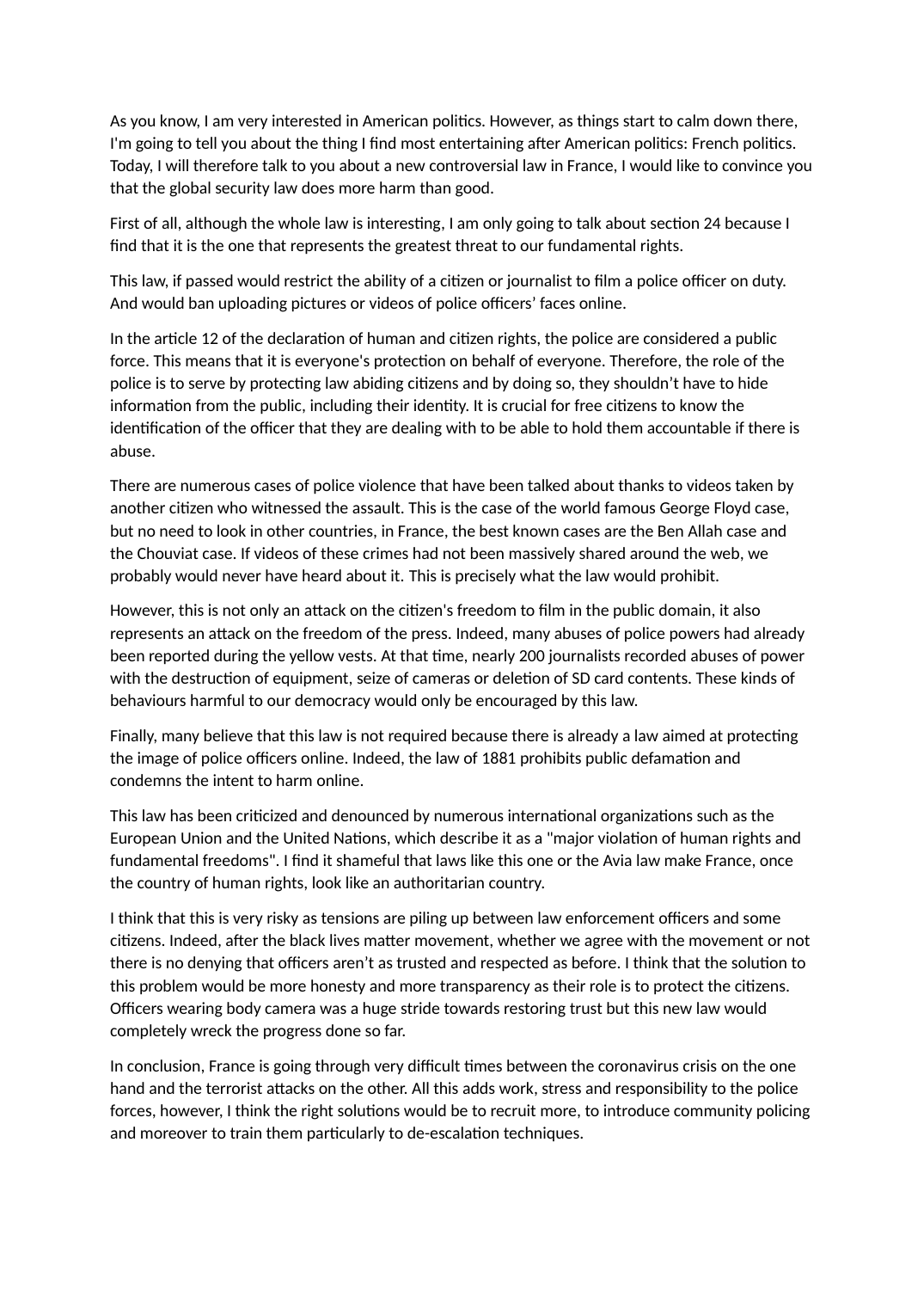Exposé anglais loi sécurité globale
Publié le 03/01/2021

Extrait du document
«
As you know, I am very interested in American politics.
However, as things start to calm down there,
I'm going to tell you about the thing I find most entertaining after American politics: French politics.
Today, I will therefore talk to you about a new controversial law in France, I would like to convince you
that the global security law does more harm than good.
First of all, although the whole law is interesting, I am only going to talk about section 24 because I
find that it is the one that represents the greatest threat to our fundamental rights.
This law, if passed would restrict the ability of a citizen or journalist to film a police officer on duty.
And would ban uploading pictures or videos of police officers’ faces online.
In the article 12 of the declaration of human and citizen rights, the police are considered a public
force.
This means that it is everyone's protection on behalf of everyone.
Therefore, the role of the
police is to serve by protecting law abiding citizens and by doing so, they shouldn’t have to hide
information from the public, including their identity.
It is crucial for free citizens to know the
identification of the officer that they are dealing with to be able to hold them accountable if there is
abuse.
There are numerous cases of police violence that have been talked about thanks to videos taken by
another citizen who witnessed the assault.
This is the case of the world famous George Floyd case,
but no need to look in other countries, in France, the best known cases are the Ben Allah case and
the Chouviat case.
If videos of these crimes had not been massively shared around the web, we
probably would never have heard about it.
This is precisely what the law would prohibit.
However, this is not only an attack on the citizen's freedom to film in the public domain, it also
represents an attack on the freedom of the press.
Indeed, many abuses of police powers had already
been reported during the yellow vests.
At that time, nearly 200 journalists recorded abuses of power
with the destruction of equipment, seize of cameras or deletion of SD card contents.
These kinds of
behaviours harmful to our democracy would only be encouraged by this law.
Finally, many believe that this law is not required because there is already a law aimed at protecting
the image of police officers online.
Indeed, the law of 1881 prohibits public defamation and
condemns the intent to harm online.
This law has been criticized and denounced by numerous international organizations such as the
European Union and the United Nations, which describe it as a "major violation of human rights and
fundamental freedoms".
I find it shameful that laws like this one or the Avia law make France, once
the country of human rights, look like an authoritarian country.
I think that this is very risky as tensions are piling up between law enforcement officers and some
citizens.
Indeed, after the black lives matter movement, whether we agree with the movement or not
there is no denying that officers aren’t as trusted and respected as before.
I think that the solution to
this problem would be more honesty and more transparency as their role is to protect the citizens.
Officers wearing body camera was a huge stride towards restoring trust but this new law would
completely wreck the progress done so far.
In conclusion, France is going through very difficult times between the coronavirus crisis on the one
hand and the terrorist attacks on the other.
All this adds work, stress and responsibility to the police
forces, however, I think the right solutions would be to recruit more, to introduce community policing
and moreover to train them particularly to de-escalation techniques..
»
↓↓↓ APERÇU DU DOCUMENT ↓↓↓
Liens utiles
- exposé sur les violences animalières (ANGLAIS)
- Anglais exposé: Lincoln
- Exposé Anglais The printing press
- Habeas corpusDès 1679, le Parlement anglais vote cette loi pour se prémunir contreles arrestations arbitraires, dont les rois Stuart étaient les champions.
- Exposé sur l'histoire du canada anglais


